LEADERS MEET
Ramaphosa and German Chancellor Scholz sharply disagree on Ukraine
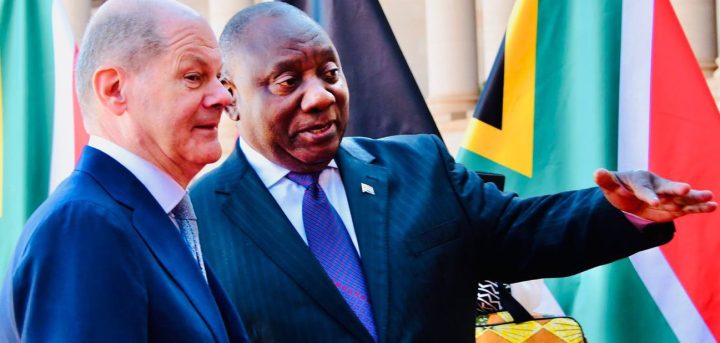
The two leaders talked past each other – and sometimes put words in each other’s mouths – in their contrasting public remarks on Ukraine at a joint press conference after their official meeting.
President Cyril Ramaphosa and German Chancellor Olaf Scholz presented radically opposed views on Russia’s invasion of Ukraine at their meeting in Pretoria on Tuesday.
The two leaders talked past each other – and sometimes put words in each other’s mouths – in their contrasting public remarks on Ukraine at a joint press conference after their official meeting.
Ramaphosa got the ball rolling by insisting that Scholz “understood” the reasons why other countries had voted with Russia or – like South Africa – abstained, on the United Nations General Assembly resolutions condemning Russia’s invasion of Ukraine on February 24. The war is still raging.
He said Scholz “understands very much” that countries like South Africa believed that negotiations, dialogue and engagement between “the two belligerent entities” – Russia and Ukraine – were the only way to end the war, as this had given birth to democracy in South Africa.
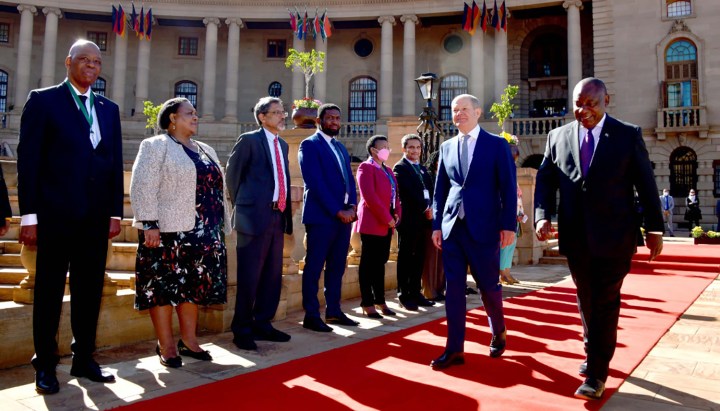
President Cyril Ramaphosa and German Chancellor Olaf Scholz presented radically opposed views on Russia’s invasion of Ukraine at their meeting in Pretoria on Tuesday. Here they walk past a guard of honour formed by the SA Cabinet ministers. (Photo: Siyabulela Duda/GCIS)
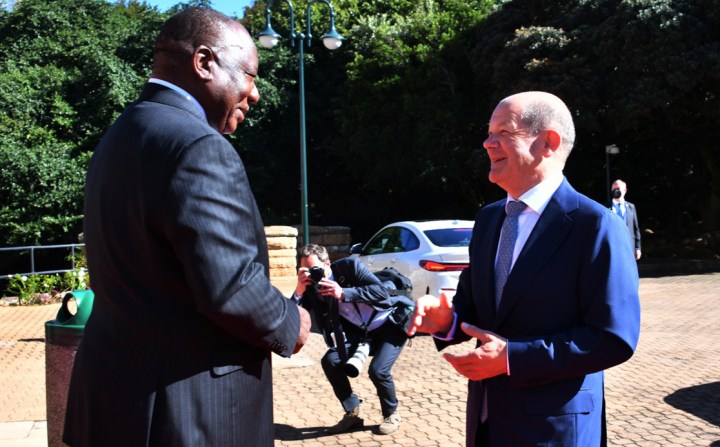
President Cyril Ramaphosa and His Excellency Chancellor Olaf Scholz of the Federal Republic of Germany during the welcoming ceremony at the Union Buildings in Tshwane. (Photo: Siyabulela Duda/GCIS)
Scholz responded by implicitly denying that he “understood” at least those countries which had voted with Russia against the UN resolutions. Voting with Russia was simply “intolerable”, he said.
And he reciprocated Ramaphosa’s gesture of putting words in his mouth by saying: “We all agree that the war which Russia started against Ukraine is a war of aggression with the aim to conquer territory that does not belong to Russia.
“It’s clear that the major challenge is now for Ukraine to defend its integrity and sovereignty. And we’re all in agreement that there must not be a violent new delineation of borders.”
Scholz went on to explain that Germany, like other Western nations, was providing Ukraine with military and other assistance to help defend itself against Russia’s “aggression”.
This was clearly not South Africa’s position. Ramaphosa did not even address Germany’s arming of Ukraine. But he criticised the sanctions that Germany, the European Union, the US and others were imposing on Russia.
These sanctions were having “an overarching impact”, causing suffering even to bystanders to the conflict, he said.
When a German journalist asked him how he could condemn these sanctions against Russia when his ANC had supported strong international sanctions against the apartheid regime, Ramaphosa simply replied those sanctions were “different”, but did not explain how.
The two leaders agreed on much else though. As expected, Ramaphosa accepted an invitation from Scholz to attend the annual summit of the G7 wealthy nations, which Germany will host next month. Scholz said that the war in Ukraine as well as other critical global issues, like the climate crisis and the Covid-19 pandemic, would top the agenda at the summit, which would want to hear Ramaphosa’s views.
He also said Germany would be buying coal from South Africa – and other nations – to replace some of the coal it would stop buying from Russia by the Northern Hemisphere’s autumn of this year as part of a wider EU embargo.
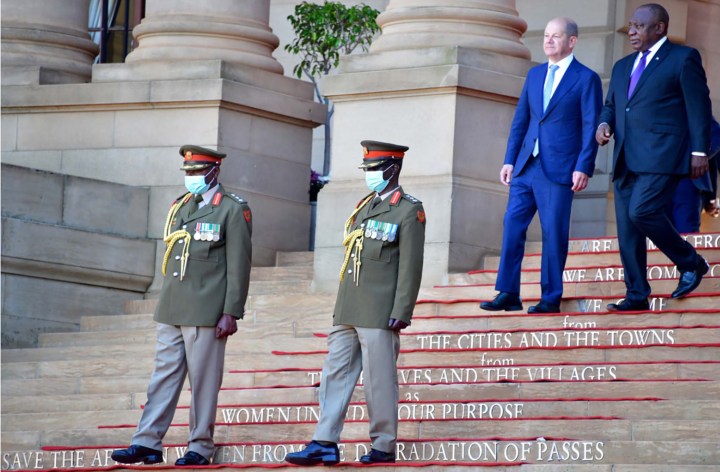
President Cyril Ramaphosa and Chancellor Olaf Scholz of the Federal Republic of Germany outside the Union Buildings in Tshwane. (Photo:Siyabulela Duda/GCIS)
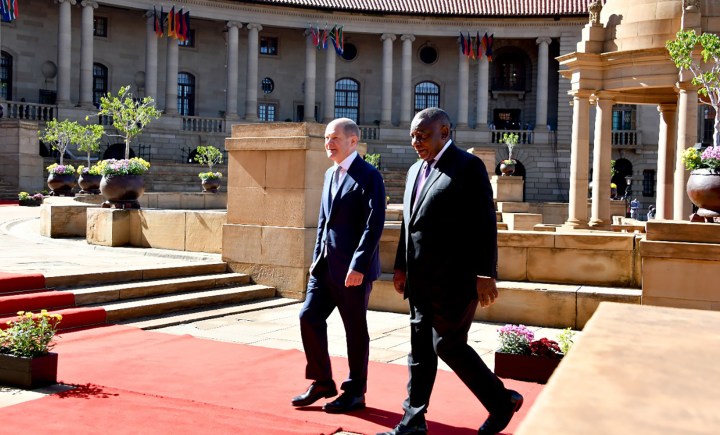
President Cyril Ramaphosa urged Chancellor Olaf Scholz to help South Africa with the major problem it was facing because no one was buying Covid-19 vaccines that were being produced in this country. (Photo:Siyabulela Duda/GCIS)
Scholz explained that Germany and the rest of the EU also aimed to stop importing Russian oil by the end of the year. For Germany, this required some technical adjustments to enable the country’s two refineries to receive oil from ships instead of by pipe from Russia as they were now doing. Some other EU countries would take longer as they faced greater technical difficulties in adapting their infrastructure.
And he said Germany and others were also investing in new infrastructure to enable them to replace their large imports of Russian piped gas with liquefied natural gas from other countries.
Scholz said that quite apart from the war, Germany was accelerating the transformation of its energy sources to meet its target of a carbon-neutral economy by 2045. One major new energy source would be green hydrogen and he and Ramaphosa later visited the energy corporation Sasol to launch a joint project to produce carbon-neutral aviation fuel via hydrogen.
Ramaphosa said Sasol, together with the Industrial Development Corporation and the Northern Cape government, were developing a project in Boegoebaai to use solar and wind energy to export green hydrogen at a massive scale, including to the EU, which was looking to import 10 million tonnes a year by 2030.
He noted that South Africa and Germany were already cooperating in the Just Energy Transition Partnership – with France, the UK, the US and the European Union – that was announced at COP26 late last year. The partner nations agreed to put up $8.5-billion to help SA transition from its heavy dependence on coal to a green economy.
Ramaphosa also urged Scholz to help South Africa with the major problem it was facing because no one was buying Covid-19 vaccines that were being produced in this country. This should be a concern to Germany as well, he said, because Germany and other Western nations were supporting programmes for South Africa to produce its own vaccines.
Ramaphosa was referring to the fact that Africa’s largest pharmaceutical company, Aspen Pharmacare Holdings, which became the continent’s first manufacturer of Covid-19 vaccines this year – under licence to Johnson & Johnson – has so far been unable to get a single order from any buyer.
He said he had asked Scholz to help ensure that vaccines produced in Africa were given a greater market share in developed countries and that vaccines destined for African populations should be procured locally. The African Union has set a target of reducing its dependence on foreign vaccines from 99% to 40%.
But neither he nor Scholz indicated if the chancellor had agreed to give this support. DM
[hearken id=”daily-maverick/9472″]
"Information pertaining to Covid-19, vaccines, how to control the spread of the virus and potential treatments is ever-changing. Under the South African Disaster Management Act Regulation 11(5)(c) it is prohibited to publish information through any medium with the intention to deceive people on government measures to address COVID-19. We are therefore disabling the comment section on this article in order to protect both the commenting member and ourselves from potential liability. Should you have additional information that you think we should know, please email [email protected]"






 Become an Insider
Become an Insider